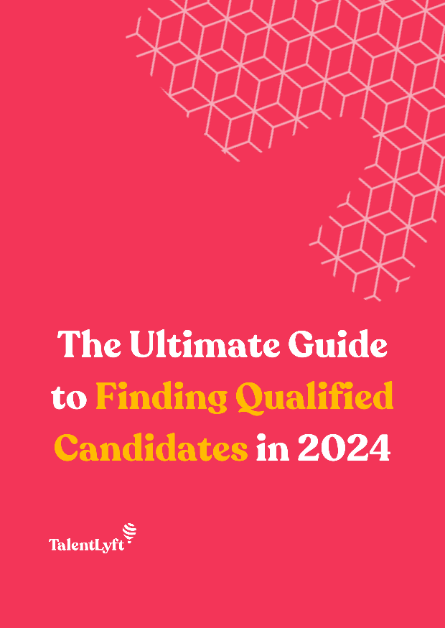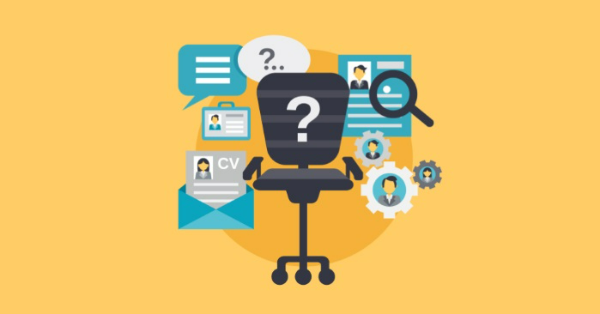![https://adoptoprod.blob.core.windows.net/article/JOUmfIteBEyBJX-Svp6eiA.png]()
Why is it important to be a good interviewer?
Being a good interviewer is of utmost importance if you want to recruit the right people for your company. Conducting job interviews is the crucial part of your recruitment strategy, which can make or break your entire recruiting process.
➡️ Download The Ultimate Candidate Interview & Employee Onboarding Checklist!
All your time and effort invested in finding the right job candidates will go to waste if you don’t know how to select the best among them. Unfortunately, selecting the best candidates isn’t easy.
Selecting the best person for the job isn’t as simple as hiring the candidate with the best skills and the needed experience. The person you hire needs to be the best choice not only for your open job position, but also for your company culture. You need to hire the best talent by finding the perfect fit.
Most employers don’t know how to do that. According to a recent CareerBuilder survey, nearly three in four employers (74 percent) say they've hired the wrong person for a position.
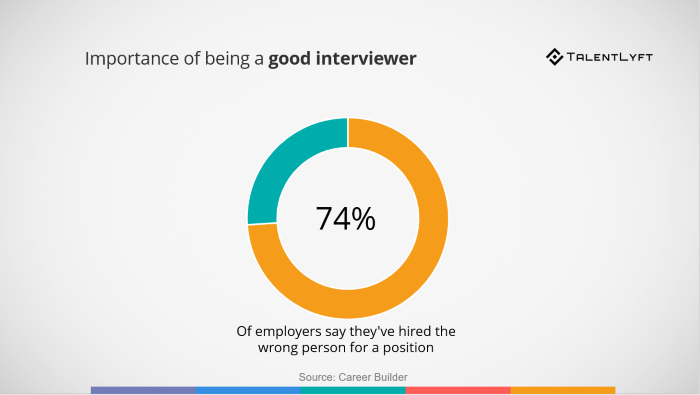
Hiring the wrong person for the position can have a disastrous impact on your company. The global survey, conducted by Harris Interactive, has found that a bad hire can cost a company upwards of $50,000! 😲
Finally, being a good recruiter will ensure that your chosen candidate accepts your job offer. According to LinkedIn Global Talent Trends Report, 83% of talent say that a negative interview experience can change their mind about a role or company they once liked.
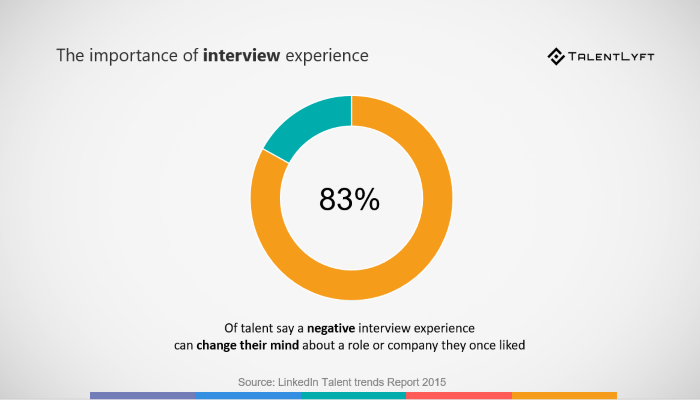
How can you become a better interviewer?
Interviewing is an art.
If you want to be a good interviewer, you need to learn how to select the best candidates not only for the job but also for the company. You need to ask the right questions in the right way, maintain the right demeanor and read your candidates’ body language.
Good interviewers are those who know how to select the best candidates AND provide a great candidate experience.
Being a good interviewer requires a lot of knowledge and practice. In this guide, I will share useful tips and tricks to help you conduct great interviews.
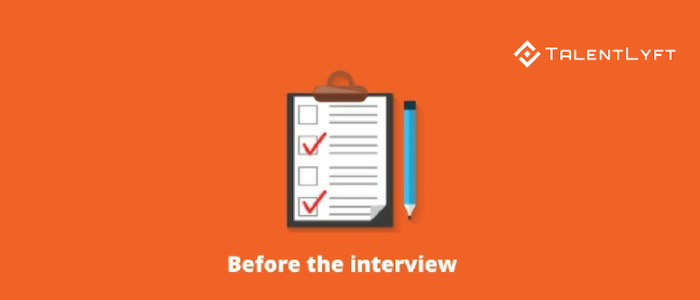
How do good interviewers prepare for the interview?
The secret of being a good interviewer is in preparation. A good interviewer spends a lot of time and effort preparing for the interview. I can't stress this enough: A thorough preparation process is a key to great interviews!
There are many things you need to prepare before the actual interview takes place.
If you want to be a good interviewer, here is what you should do before the interview starts:
Step #1: Review the job description
If you use job description templates, make sure they are reviewed and adjusted to fit your company’s specific needs. You need to know every detail of your open job position and have a clear idea about job duties, job responsibilities and job requirements.
Step #2: Have a clear picture of your ideal candidate
Before you start interviewing, you need to have a clear picture of your ideal candidate. This is why you need to create your candidate persona. Have a clear idea of this person’s characteristics, skills, knowledge and experience, as well as motivation and interests.
Step #3: Select the best interview questions
One of the most important steps in your interviewing process is selecting the best job interview questions. Besides questions that will enable you to assess your candidates’ skills and experience, make sure to include cultural fit job interview questions as well.
Step #4: Develop a rating system
Develop a rating system with precise criteria for each and every one of your selected job interview questions. This is extremely important! Many recruiters skip this part, but that is a big mistake. Without it, you won’t be able to assess your candidates’ answers in an objective and transparent way.
Step #5: Create an interview timeline
Outline the course of your interview. Will you start with a warm welcome and informal chat? Or you plan to conduct a more formal introduction? You should walk in every interview knowing exactly which questions you will ask, in what order and how long each should take to answer.
Step #6: Research job candidates
Make sure you have thoroughly researched every candidate that comes in for an interview. Go through every line of their resume and cover letter. Carefully study their portfolio, work samples and/or assignment. Make notes if you want to address some interesting points during the interview.
Step #7: Prepare your pitch
Remember that an interview is a two-way process. The same way you are evaluating candidates, they are also evaluating you and your company. Make sure you have prepared a compelling pitch for selling your employer brand and your company’s culture, perks and benefits.
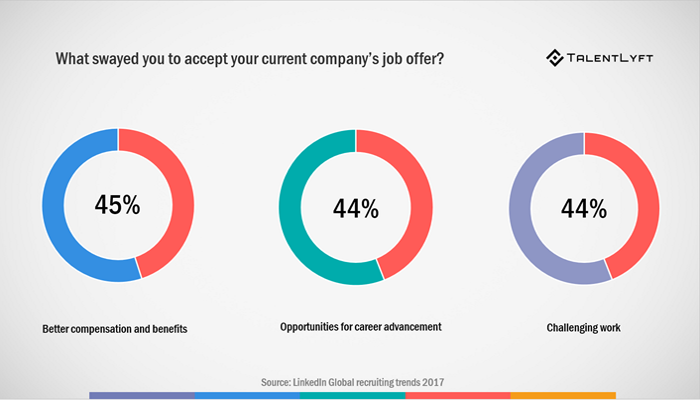
Step #8: Schedule the interview
Good interviewers always schedule the interview on time! The best practice is to send 3 emails to candidates. First, send a customized interview invitation email which includes a few different day and time options, location, interview type and an approximate duration of the interview. After you receive your candidates’ response, send the interview confirmation email. Finally, send an interview reminder email to candidates a day or two before the set date.
Are you spending a lot of time scheduling your interviews?
With TalentLyft, you can sync your Outlook and Google calendar with the tool and get all calls, interviews and meetings scheduled through the tool added to your calendar.
Learn more Step #9: Reserve the room/venue
Good interviewers ensure always ensure a venue where they can conduct an interview undisturbed. Reserve the appropriate office space such as a meeting or conference room. To avoid intrusions and interruptions during the interviews, make sure your colleagues know that you won’t be available for consultations, calls or meetings.
Step #10: Prepare food and drinks
A small gesture such as preparing a glass of water and offering your candidates with cookies and tea or coffee can go a long way. Make sure to prepare everything you need in advance or have your colleague available to make and bring a tea or coffee for your candidate. Be a kind and considerate interviewer. :)

How do good interviewers conduct the interview?
Conducting interviews is a complex process. Good interviewers know that conducting a job interview is much more than simply asking questions and listening to candidates’ answers. Good interviewers also have to keep the interview on the right track, watch the time and be mindful of the candidates’ and their own body language - all at the same time!
To help you excel at all these important tasks, here are my best practice tips for conducting great job interviews:
Tip #1: Give a warm welcome
A good interviewer sets the stage for a successful interview by giving a warm welcome to your candidates. Make sure that your body language is positive, that you have a firm handshake and a big welcoming smile on your face.
Tip #2: Outline the interview structure
A good interviewer outlines the interview structure for the candidate right at the beginning of the interview. This will make candidates feel more in control, which will help them relax and feel more at ease. Make sure to tell them the planned duration of the interview.
Tip#3: Make an introduction
Shortly introduce yourself, your company and the position. Don’t assume that candidates know everything about your company and position. A good interviewer makes everything clear by highlighting the most important information.
Tip#4: Conduct structured interviews
The best interviewers always conduct stuctured interviews. A structured interview is a type of interview in which the interviewer asks a particular set of questions planned in advance. Print out your questions and bring them with you to the interview site. Stick to your questions list and ask all candidates the same questions in the same order.
Tip#5: Make it a conversation
Although you will have a list of question you need to ask, don’t let your interview turn into an interrogation. Don’t just wait for the candidate to stop talking to ask another question. Make it a conversation! Listen carefully and engage with your candidate in a natural way, just as you would in a regular conversation.
Tip#6: Take notes
Don’t assume that you will remember everything your candidate said - take notes! Don’t use a laptop because it creates a physical barrier between you and the candidate, which is off-putting. Also, don't write on their printed resumes. A good interviewer has scorecards printed out on paper and uses them to make notes.
Tip#7: Keep an open mind
Be mindful and honest about your potential biases. Good interviewers avoid getting swayed by the first impression and spending the rest of interview looking for an evidence to support it. Give candidates a chance to surprise you! Instead of jumping to conclusions, rephrase your candidates’ answer and check if you understood them correctly.
Tip#8: Watch the body language
Good interviewers pay attention to candidates’ body language. Candidate’s body and face send many different nonverbal cues that can provide extremely useful insights. However, avoid making assumptions unless you’ve studied good practices for reading your candidates’ body language. Keep in mind that your body sends out signals as well!
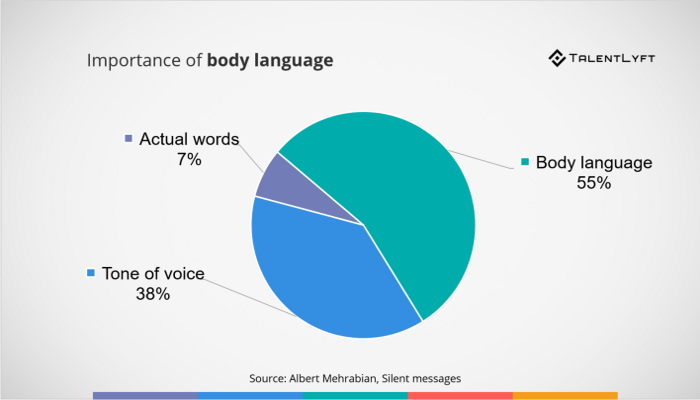
Tip#9: Be collaborative
Good interviewers include other people in the interview process. A good idea is to invite a representative of a team your selected candidate will be a part of to join the interview. That way, you can assess candidates skills and fit more effectively, which is just one of the many benefits of collaborative recruiting.
Tip#10: End the interview in the right way
Good interviewers always end the interview in the right way. Leave enough time at the end of the interview and give candidates a chance to ask questions. Describe the next steps and provide an expected timeline. If possible, give your candidates a short office tour to provide them with a glimpse into your company culture.

What good interviewers do after an interview?
Many good interviewers I know say that the hardest part of their work starts after they have conducted job interviews with all candidates. This is because in this phase interviewers need to make an actual decision about who you are going to hire. Interviewers also need to let all other great candidates you’ve met and interviewed that they didn’t get the job.
Here is how good interviewers go about this process:
Step #1: Evaluate your notes
First, go through your notes and put them in order. Systematically arrange all the information you gathered during the interviews. The result of your work should be exhaustive candidates’ profiles and comparable scorecards.
Step #2: Choose the best candidate
If you have completed the previous step, choosing the best candidate should be fairly easy. Use your scorecards to rate each candidate against your previously set criteria. After you have completed this process for each of your interviewees, select your top 3 candidates with the highest scores. Finally, compare them against each other and make your decision.
Step #3: Send a job offer to the selected candidate
The best way to inform the candidate that they got the job is to pick up a phone and call them! When candidates confirm accepting your job offer via phone, you should send them a formal job offer letter or email as soon as possible! Formal job offer letter/email should include information on the position, compensation, additional compensation such as bonuses, working hours and different types of benefits. Make sure you also outline the next steps and provide necessary onboarding details.
Step #4: Inform rejected candidates about your decision
As soon as your selected candidates accept your job offer, contact all other candidates to inform them that they didn’t get the job. It is crucial that you know how to say “Sorry, you didn’t get the job” in a way to maintain a strong employer brand. Make sure you send only customized post-interview rejection emails and give a brief explanation of the main reason why they didn’t get the job.
Step #5: Engage with your silver medalists
Keep in mind that the candidates you have rejected for this specific job position may be a good fit for some other future or even a current job opening at your company. Add them to your talent pool and keep them engaged until the right opportunity comes by. This is the final secret of good interviewers - they know that keeping in touch with their silver candidates is essential for more productive and faster hiring process.

Key takeaways on becoming a great interviewer
A good interviewer knows how to select the best candidates and provide a great candidate experience.
To be a good interviewer, it is not enough to follow the best practices for conducting job interviews. A good interviewer knows that the key to successful interviews lies in the preparation. A good interviewer also completes a number of important tasks after the interview takes place.
In this guide, I outlined all the important steps you need to take before, during and after the interview in order to make your interviewing process effective and efficient.
Implement these tips to ensure a smooth interviewing process and hone your interviewing skills!
Interviewer characteristics [INFOGRAPHIC]
![Interviewer characteristics [INFOGRAPHIC]](png/cjf8bu7fwuc5boxuhsto1a.png)
Take your interview process to a whole new level!
If you’re a very ambitious interviewer looking to make your interviewing process even more effective, we can help! 💪
Our TalentLyft Track solution can make your interviewing process much simpler and more organized.
For starters, you could schedule every interview with just one click!
Imagine sending automated emails with an interview appointment that automatically sync with your work calendar. Cool, huh? 🙂
You can also prepare your interview questions and score different candidates’ answers at the spot. Use our existing scorecards to evaluate your candidates, or create your own based on specific job interview questions.
Sounds interesting? 🤔
Try our services for free (for 14 days, no credit card required to sign up, cancel anytime)!
Once you are in the free trial, you can let our team know about your needs in the live chat.
During the free trial, we will help you set up a winning, hassle-free interview process!












![Interviewer characteristics [INFOGRAPHIC]](png/cjf8bu7fwuc5boxuhsto1a.png)
